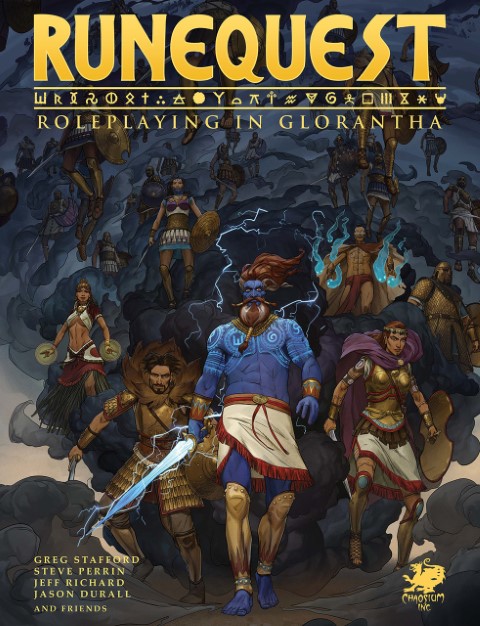
Simplifying Runequest's Critical System
Proposes a universal 10s/5s critical scheme for Chaosium percentile games to speed resolution, add special failures, and reduce sheet-checking.
I've always been drawn to systems that offer depth and engagement. Runequest, with its skills-based approach, certainly fits the bill. It encourages players to think creatively about their characters' abilities in every situation, rather than waiting for the perfect moment to use a class-specific power as in D&D. However, even the most beloved systems can have their quirks, and for me, Runequest's handling of criticals has always been a sticking point.
I am taking inspiration from the way another percentile system I'm fond of does crticials, Harnmaster. The system is flows so naturally, I thought using something similar here could be very useful for Runequest any any of the systems under Chaosium's banner.

The Current System: A Brief Overview#
For those unfamiliar with Runequest, Call of Cthulhu, or the Basic Roleplaying System from Chaosium, here's a quick rundown:
- Each skill has a percentage value, usually based on 5x an Ability Score.
- Rolling equal to or below that value is a success; above is a failure.
- Critical successes, Special successes, and Fumbles are determined by ranges calculated individually for each skill based on the current percentage value.
While this system works, it can lead to some tedious moments during gameplay. Players often need to pause after each roll to consult their character sheet, checking if their result falls within these specific ranges. An efficient player might look this up and have it in mind when they go to roll, but my experience is most roll then look up those several values. This interruption can disrupt the flow of the game and pull players out of the immersive experience we all strive for.
A Proposal for Streamlined Critical Resolution#
What if we could maintain the depth of the Runequest system while simplifying this particular aspect? I'd like to propose a standardized pattern for critical results that could speed up play and reduce the need for constant reference checking. Here's how it would work:
- Roll for success or failure as normal.
- If the roll is successful:
- Multiples of 10 (10, 20, 30, etc.) = Critical Success
- Numbers ending in 5 (05, 15, 25, etc.) = Special Success
- If the roll is a failure:
- Multiples of 10 = Critical Failure
- Numbers ending in 5 = Special Failure (a new concept we could introduce)
Or in more simple terms: A 10s value is always a Critical Success or Failure, and a 5s value is always a Special Success or Failure. It's that simple.
This system offers several advantages:
- Ease of Use: Players only need to remember a simple pattern rather than consulting individual skill ranges.
- Consistent Application: The same rule applies across all skills, reducing confusion.
- Quick Resolution: Players can immediately recognize special results without pausing the game.
- Maintains Depth: We're not removing the concept of criticals or specials, just changing how we determine them.
Potential Impacts and Considerations#
It's worth noting that this system, while similar in spirit to the original rules, doesn't map exactly to the intended probabilities of the Runequest system. However, I believe the slight statistical differences would be a small price to pay for the significant boost in gameplay fluidity.
Also, it's worth nothing that if a skill value is 9% or below, the character can't score a Critical Success. To me this is fine because, at that point, be grateful you succeeded at all!
Additionally, this system introduces the concept of a "Special Failure," which could add an interesting new dimension to gameplay. Perhaps these could represent near-misses or failures that still provide some benefit or information to the character. For instance, if a game uses the "push" mechanic from Call of Cthulhu, the GM could rule that a Special Failure is the same a critical failure. Alternatively, a GM could use Special Failure to mean only a partial failure. For example, the character might have failed to make that jump but instead of falling they are holding on by their fingertips and about to fall. This could add another intersting dimension to gameplay.
Implementing the Change#
If you're intrigued by this idea and want to try it in your Runequest game, here are a few suggestions:
- Discuss with Your Group: Any rule change should be a group decision. Present the idea and get feedback.
- Trial Run: Consider trying the new system for a session or two before fully implementing it.
- Adjust as Needed: If you find the new system changes the game balance too much, consider tweaking the numbers. Maybe criticals could be on rolls ending in 1 instead of multiples of 10, for instance.
Remember, the goal of any house rule should be to enhance your group's enjoyment of the game. If this system doesn't work for your table, that's perfectly okay!
Conclusion#
Chaosium has an excellent system in Runequest and Call of Cthulhu but I find it a little cumbersom to look up and juggle the current result system values. By streamlining this, we can potentially make it even more accessible and enjoyable. Whether you decide to try this proposed system or stick with the original rules, the most important thing is that you're out there rolling dice and creating amazing stories with your friends.
What do you think about this proposed change? Have you used similar systems in other games? I'd love to hear your thoughts and experiences in the comments below. Happy gaming!
Drop a comment on X and let me know your thoughts!